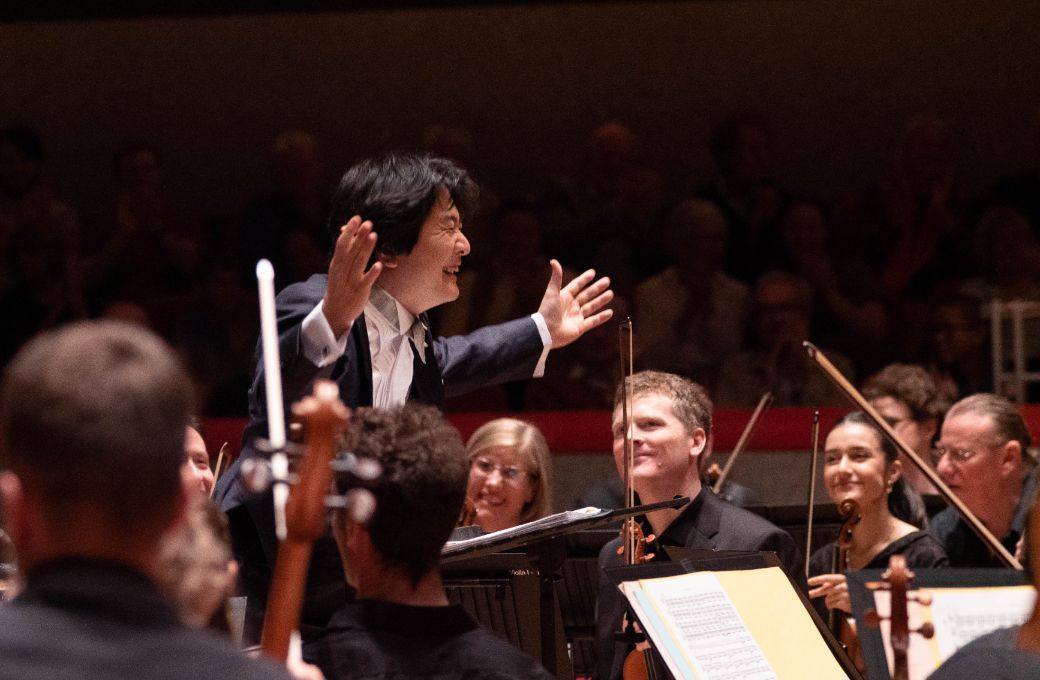Joy. That’s the keyword in the City of Birmingham Symphony Orchestra’s forthcoming 2024–25 concert season: “Season of Joy”. Yet it’s also an apt keyword for the orchestra’s Chief Conductor and Artistic Advisor, recently redesignated as Music Director, Kazuki Yamada. In the 12 months since his tenure at Birmingham began, and even before that, during his several years as Principal Guest Conductor, Yamada has demonstrably stamped his personality on the CBSO – in terms of both attitude and sound – in a way that perhaps no-one has since Rattle in the 1990s.

He may only be a year into his role at the helm in Birmingham, but Yamada is keen to stress, and celebrate, the fact that the relationship began over a decade ago, in 2012. “It was so quick, only one day of rehearsal, and then the concert! But already, the orchestra had a great sound – wow! – no problem at all. So, a very good orchestra, but there wasn’t time to get enough of an impression.” Yamada returned in 2014, and the situation was the same, but everything changed two years later, when the orchestra was planning a tour of Japan. This was during the interregnum between Andris Nelsons’ departure and Mirga Gražinytė-Tyla’s arrival, and Yamada was asked to direct the CBSO for the tour: “I was super lucky!” Through the course of the two weeks and eight concerts they performed together, conductor and orchestra finally got to know each other much better. “At the end, I organised a party. I requested traditional Japanese food, but it was very difficult to feed 100 people…” As a result, they ended up eating something rather more prosaic: “American hamburgers! But all the musicians came, and we had a family feeling. I gave a small speech; I said, ‘I know you have had many great conductors, more than me, but I can say I am the happiest conductor with you.’”
This early chemistry was the beginning of the beautiful friendship between Yamada and the CBSO that has continued ever since. Yamada says the recent re-jigging of his title, to Music Director, isn’t a fundamental change, but reflects something of his determination to be deeply involved in all aspects of the orchestra’s vision and activities. Apropos: as an upbeat to their new season, members of the orchestra have been taking part in “CBSO in the City”, a week-long initiative out and about in venues and open spaces in the centre of Birmingham. The day before our conversation, this included Yamada himself playing piano for passengers on the trams.
“I like to be involved in almost everything. We did a concert two days ago in a shopping centre. It could have been done by an assistant conductor. But I think it’s very important the Music Director should have a presence there. I want to be present. On the tram, it was big fun, I really enjoyed it, but the tram was so quick! I played Japanese and British folksong.” Music of the people, for the people, it’s all part and parcel of Yamada’s obvious yearning to forge an ever-stronger connection to the public and encourage them to come closer, and become audiences of the future.
One of the imminent highlights of that future are four of the biggest ninth symphonies – by Beethoven, Bruckner, Dvořák and Mahler – all of which will be featured in the CBSO’s 2024–25 season. The season takes part of its name from the climactic text of the Beethoven, Ode to Joy, yet despite its crowd-pleasing qualities, Yamada has tended to distance himself from the work in more recent years, and for the most unexpected of reasons. “Beethoven 9 is really quite famous in Japan”, he explains. “It’s quite a strange tradition, but it’s only performed in December, at the end of the year. Every orchestra is doing it, and I conducted it a lot – maybe too much! And then, I decided to stop conducting Beethoven 9. But with the CBSO I’d like to try a new way, a new style.”
This isn’t the only extra-musical association that Yamada would like to move beyond. With both Bruckner’s and Mahler’s ninth symphonies, in particular, the topic of death hangs over them, and a concomitant sense of ending, and farewell. Yet Yamada is keen that these works should not be defined or limited by such connotations. “I thought, with the CBSO, maybe we can do it another way. These pieces are very special for me. They’re so linked to the heavens, they can connect, become a dialogue, between there and here.” He points to the skies, and it’s clear that Yamada feels this spiritual connection very strongly.
“When I’m conducting these pieces, through the music I feel I can connect with people who have died.” He speaks of a performance of Mahler 9 with an amateur orchestra, where he became deeply moved. “I’m not used to crying – I can be very emotional, but that concert, I was crying so much. During the pianissimo, the only sound was me sniffing! I realised: we can be positive. Music like this can be sad, but through it we can connect. Maybe when we listen we remember who has died, but we recover and remember that life will be continued forever. It’s a good message, to be positive.”
It's precisely this kind of positivity, as demonstrated by his actions on, and results from, the podium, that have already become a defining characteristic of Yamada’s music-making with the CBSO. And it’s already become clear that, while taking an eclectic, open-minded approach, he leans toward certain kinds of repertoire. Often drawing on French music (Berlioz, Saint-Saëns, Ravel, Poulenc), which is clearly a special favourite, alongside such stalwarts as Dvořák, Tchaikovsky, Rachmaninov and Bernstein, there’s the distinct impression that Yamada is most at home in music that offers opportunities either for sensuality or showmanship. “It depends on the piece”, he explains. “When I can see a picture in my head, I feel a close distance, and understand the drama. Some pieces work for me, not others, but these composers, especially French music, is very comfortable for me.” He credits his time as Principal Guest Conductor to the Orchestre de la Suisse Romande for instilling in him a love of this kind of repertoire. The way he sums up what he needs from any music in order to make it his own could hardly be more French: “I need three big things to flavour the music: temperature, smell, colour.”
However, this outlook also extends to more unusual repertoire. Alongside a familiar foreign import, Takemitsu, the CBSO’s new season Yamada will also be introducing audiences to works by less well-known figures. These include Kimmo by Swedish composer Anders Eliasson (whose particular blend of lively and lyrical music could hardly suit Yamada better), and the Symphony by Japanese composer Akio Yashiro.
“When I became the chief conductor I had plenty of ideas for introducing Japanese pieces. Almost everyone knows the name Takemitsu, but there are many great unknown composers. Yashiro is a very special composer, he died so early…” – at the age of 46 – “…it’s very sad. He only wrote three orchestral pieces, and we can say that the Symphony is the great one.” Though Japanese, Yamada’s musical French connection is relevant to this work too. “He studied in Paris [with Messiaen and Nadia Boulanger], and he loved French music, and the French way to compose. I hope the Birmingham people will like it, but I want to push it, it’s a good piece.”
The determination to present new works alongside familiar repertoire is part of another, highly important aspect of Yamada’s collaborative relationship with the CBSO: risk. Yamada speaks emphatically of the effect the orchestra has had on him. “I’m learning a lot from them. I’m changing a lot. I get confidence from them. I have many ideas, and I can try them out with them – and with the CBSO the response is always 105%, 110%!”
Joy and risk, it’s an interesting, perhaps unexpected combination of elements, but it’s clear that, for Yamada, they’re not just essential but complementary elements in music-making for the future. Considering his overwhelming positivity, it’s not surprising to hear that it’s a future Yamada feels very optimistic about. “The future: it’s a good question, an important question. We need to be better than yesterday. But with the CBSO, they’re the easiest orchestra to take on all challenges, and we can all take risks together.”
Kazuki Yamada conducts Beethoven’s Ninth Symphony with the CBSO on 19th September. They perform Bruckner’s Ninth in December, and Mahler’s Ninth in March.
See all upcoming concerts by the CBSO.
This article was sponsored by the City of Birmingham Symphony Orchestra.


